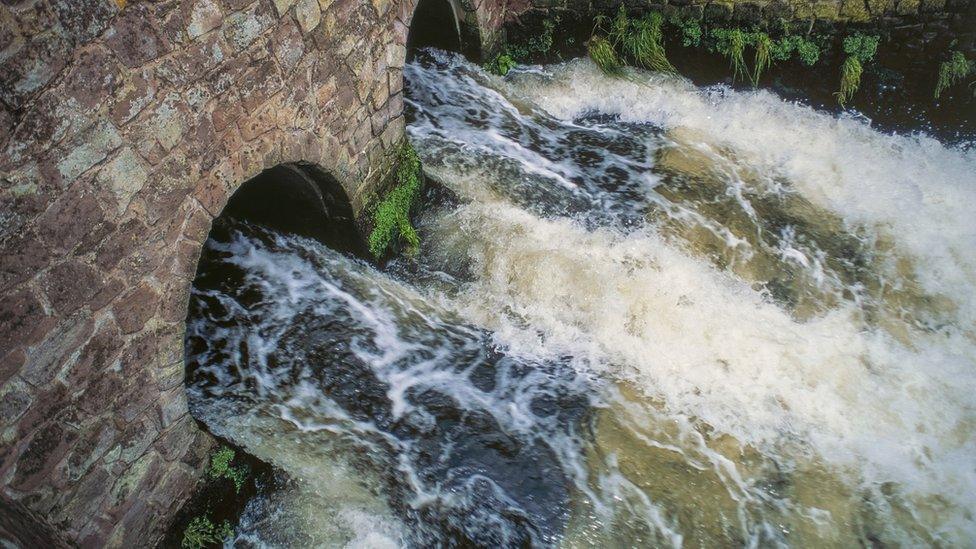ΒιΆΉΤΌΕΔ investigation suggests three big water companies illegally dumped sewage in 2022
- Published
- comments

Sewage can be discharged into rivers when sewers become overwhelmed
New data suggests three of the England's major water companies illegally dumped sewage hundreds of times last year.
The ΒιΆΉΤΌΕΔ investigation found Thames, Wessex and Southern Water practised something known as "dry spilling" for 3,500 hours in 2022.
That's when untreated - poo, wee and everything else that goes down toilets, sinks and drains - is released when it's not raining.
Dry spilling is banned because it can lead to a high amounts of sewage in river and sea water.
Water UK, who represent water companies, said the spills "should be investigated".
Why is sewage released in rivers and seas?
Why is sewage closing beaches?
Companies are sometimes allowed to spill sewage following heavy rainfall to prevent the system becoming overloaded, which could lead sewage to overflow and even into people's homes via toilets and plugholes.
But the criticism has been that these spills are happening too often.
Swimming in water where untreated sewage is discharged can lead to serious illnesses - such as stomach bugs resulting in diarrhoea and/or vomiting - as well as causing breathing problems, skin, ear and eye infections.
Wildlife, including fish and insects, are also harmed or die as a result of sewage pollution, and it can cause algae blooms which starve fish and other living things of oxygen.
What is a dry spill of sewage?
A dry spill is dumping sewage into waterways - like rivers and the sea - when it's not raining, meaning it doesn't get diluted by water.
This means it is very concentrated - or strong - and is a real risk to human and animal health and other living things too.
It is illegal in the UK.
What are the water companies accused of doing?
The ΒιΆΉΤΌΕΔ investigation requested data from all nine water companies in England, asking when their spills started and stopped in 2022. Only Thames, Southern and Wessex provided details.
The team then cross-referenced this with rainfall data from the Met Office to identify if and when any dry spills happened.
The six other water companies contacted said they could not respond due to being under an Environment Agency (EA) criminal investigation.
According the ΒιΆΉΤΌΕΔ's climate and data team, Thames, Southern and Wessex Water collectively released sewage on dry days 388 times throughout 2022.
There even appears to have been spills by all three companies on 19 July 2022 - the hottest day on record.
Wessex Water contested some of the spills highlighted by the ΒιΆΉΤΌΕΔ, citing doubts over the accuracy of its own data.
How have people reacted to the alleged sewage dumping?
Environment Secretary Therese Coffey told ΒιΆΉΤΌΕΔ News: 'It does seem extraordinary on the hottest day of the year that there may be releases. The EA is the regulator they are the people who do the detailed investigation of why that has happened."
Tideway Tunnel: Ricky visits London's new super sewer
Any illegal spills should be investigated by the EA and water firms can face anything from a warning to an unlimited fine.
The government has revealed that the EA recorded 115 cases of illegal operation in 2022 for the three water companies - that's less than a third of those found by the ΒιΆΉΤΌΕΔ analysis.
The EA's environmental protection budget, funded by the government's Department for Environment, Food and Rural Affairs (Defra), was halved between 2010-20.
The EA's chief executive, John Leyland, told the ΒιΆΉΤΌΕΔ: "We've seen a steady decline in some of our funds and so we've had to change.
"We've been focusing on digital monitoring, but earlier this year we announced a programme of increased investments in real people on your riverbank.
"We are committed to increasing our regulatory presence to hold the water companies to account."
Water Minister Rebecca Pow told the ΒιΆΉΤΌΕΔ she considers the amount of sewage discharged into the English waters "utterly unacceptable", and said the protection budget had been increased by 12% since last year.
- Published5 July 2023
- Published28 January 2023
- Published7 August 2023
